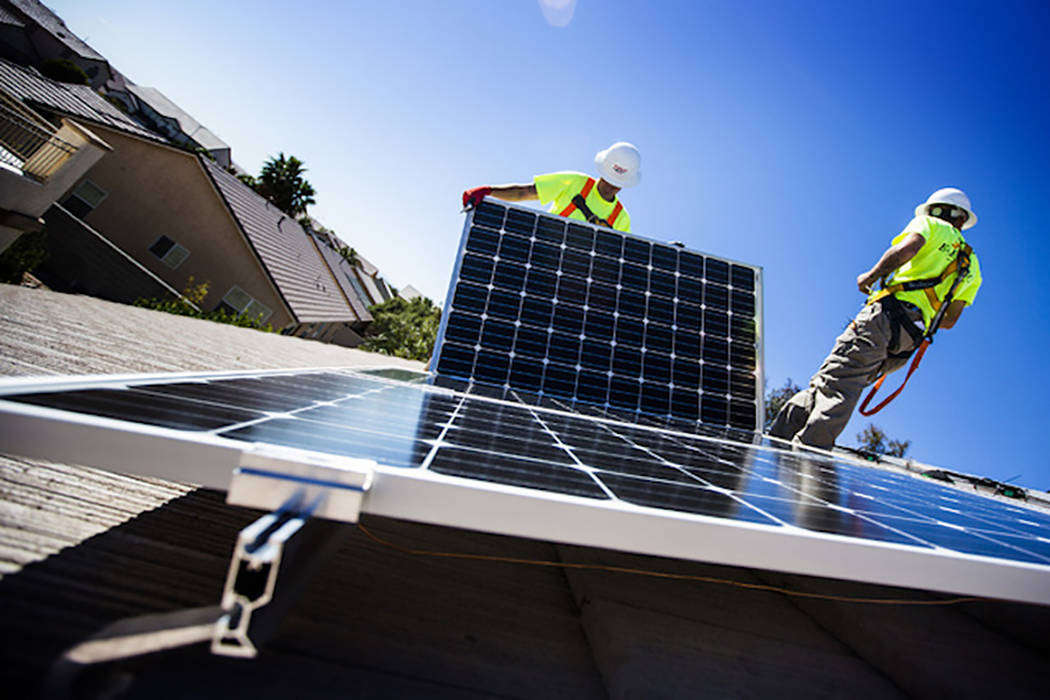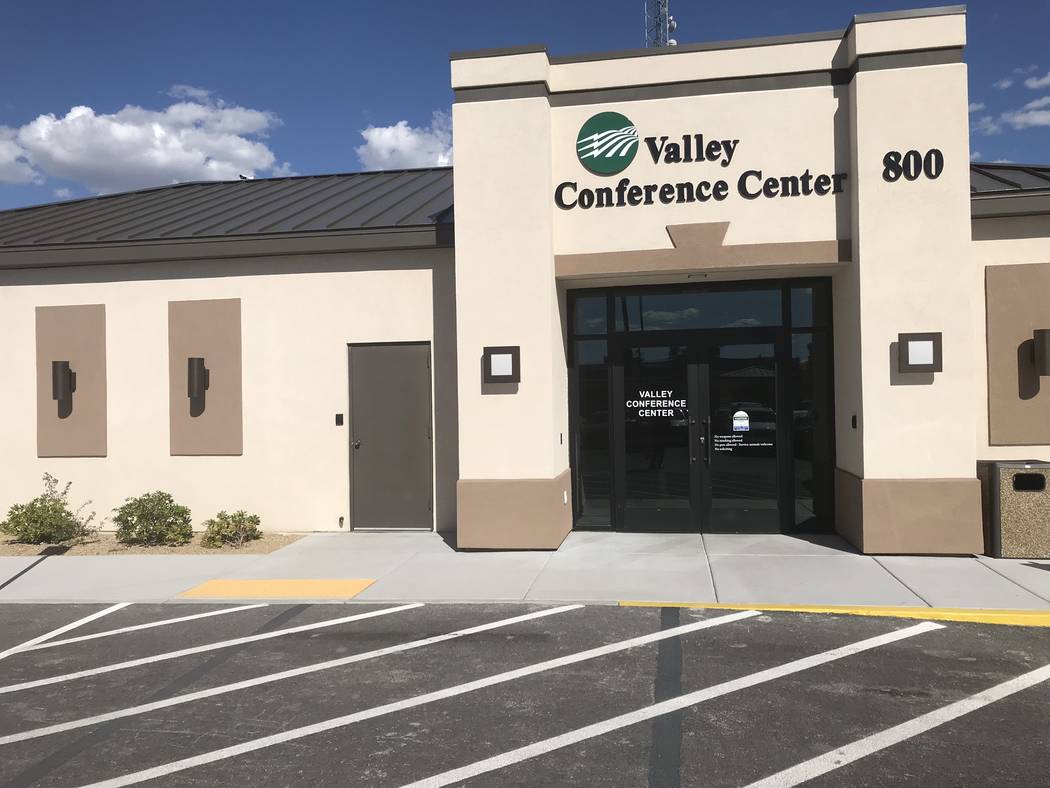VEA to deliberate net metering policy at upcoming meeting
Editor’s note: This is Part 1 of a look at Valley Electric Association’s possible restructuring of its net metering policy.
Valley Electric Association Inc.’s board of directors heard presentations on net metering and related state policies in Nevada from experts during its June board meeting in Pahrump. The board is mulling over a proposal that could alter the co-op’s program on net metering to potentially decrease the rate paid to member-owners.
Nevada Sen. Chris Brooks, D-Las Vegas, addressed Valley Electric’s board during its regular meeting at the end of June about changes that have occurred in the solar industry and if individuals should be getting the full retail rate for energy returned to an electric utility’s grid under a net metering program.
“I don’t know that there’s a compelling argument why you should,” Brooks said in Valley Electric’s conference center to a room full of member-owners, some of which currently have solar and other renewable energy systems installed and are interconnected to Valley’s grid.
Brooks explained that the argument is not just centered around Pahrump: “That’s kind of the tug of war—not only Valley Electric is having, the Nevada State Legislature’s having, but utilities and legislatures and public utility commissions across the entire country are struggling with this and have been for years.”
Valley’s board is working on a proposal that would create a tiered system for the co-op’s more than 600 member-owners that are part of the co-op’s net metering program. The co-op currently offers 100 percent of the retail rate, 11.9 cents per kilowatt-hour, to all of Valley’s members using net metering—where those with rooftop solar get a credit for the excess energy they return to the grid.
The new tier system, set to be taken up at Valley’s Aug. 6 board meeting, would reduce the rate Valley gives for excess energy to 75-95 percent of the full retail rate of 11.9 cents per kilowatt-hour.
Assembly Bill 405
The new tier system would mirror Assembly Bill 405, which Brooks sponsored during the 2017 legislative session in Nevada. AB405, which restructured net metering in Nevada, was signed by then-Nevada Gov. Brian Sandoval.
Valley is exempt from the net metering law, Assembly Bill 405. The co-op is, however, working on a policy that mirrors the state law.
Rose McKinney-James, managing principal at Energy Works LLC, a public policy and advocacy firm that focuses on renewable energy, energy efficiency and regulatory and environmental policy, also spoke during Valley’s June meeting.
McKinney-James has served as Valley’s legislative representative since 2015, she said.
McKinney-James said the legislation, “addressed investor-owned utilities and the relationship they have with residential solar.”
“More importantly, I think it was designed to address the growing and significant demand for residential solar with the economic and financial implications that come from solar development,” she said. “It comes on the heels of significant and increasing demand in this arena, and I think the Legislature was attempting to work through a series of reactions to what had been regulatory decisions.”
McKinney-James said a list of decisions made by the Nevada Public Utilities Commission affected net metering. In 2015, the Public Utilities Commission voted in favor of a new tariff structure, which reduced the net metering rates for NV Energy customers. The PUC’s move also increased the monthly service charge for solar customers.
In 2017, much of what the decision by the Public Utilities Commission had done to net metering was reversed by Assembly Bill 405 being signed into law.
Insights are offered
Brooks spent more than 30 minutes describing the intricacies of what led to the passage of the bill at Valley’s conference center.
Brooks said he was driven to run for his current state Senate seat after the 2015 decision by the PUC.
“It caused me to want to run for office, go to the Nevada State Legislature and try to create some sort of clarity or stability in that industry,” he said. “Keep in mind, there were thousands and thousands of Nevadans who had, right or wrong, made an investment with an understanding that a certain thing was going to happen.”
Brooks explained that it was up to the Nevada Legislature to make everyone “as whole as possible.”
“And in that, AB 405 was born,” he said.
“What AB405 did was it codified the statute, what was in practice and a policy of NV Energy and the Public Utilities Commission, of grandfathering in those existing customers so that they had the full net metering that they always thought they did and then moving forward, have a declining level of reimbursement for excess energy that was returned back to the utility with the understanding that the kilowatt-hour that you return to the utility does not have full retail value,” Brooks said.
He went on to say that, “There is a policy position that the state of Nevada made to encourage rooftop solar at the demand of Nevadans, and so the policy position was to put in net metering, and to help encourage industry, and satisfy the desires of Nevadans. That was the case, it was successful, that industry is now robust and mature and needs to, can afford to have another structure, a modified structure, so that structure had declining levels of reimbursement for the kilowatt-hour that was returned to the utility.”
Brooks, though the rate was heading lower for some, thought the investment is still viable. Under the 75% bracket, member-owners connecting will get roughly 9 cents per kilowatt-hour for their excess energy.
“I’m of the opinion it still makes a perfect amount of sense,” Brooks said. “It might even be high, and so while the 75% that we currently have in statute with NV Energy is maybe a starting point. It doesn’t necessarily have to be an ending point.”
Contact reporter Jeffrey Meehan at jmeehan@pvtimes.com. On Twitter: @MeehanLv
Valley's tier system specifics
The new tier system being proposed by Valley Electric Association's board would give member-owners a certain percentage of the full retail rate of 11.9 cents per kilowatt hour in unused energy returned to Valley's grid based on the time of a member-owners application.
For Tier One, where members who interconnected with Valley prior to the generation amount exceeded 1.25 megawatts, those members will receive 95 percent of the full retail rate of 11.9 cents per kilowatt-hour. The 1.25-megawatt threshold was crossed in 2015, according to a news release from Valley. Tier Two includes those members that brought the generation from 1.25 to 2.5 megawatts, which occurred in 2017. Under that tier, members will be paid 88 percent of the full retail rate.
The next tier, Tier Three, will give those in the net metering program 81 percent of the full retail rate for excess energy. This group brought the generated amount from "2.5-3.75 megawatts" in 2019.
Members falling under Tier Four will be reimbursed 75 percent of Valley's full retail rate.
"The majority of VEA's generation of renewable energy by members comes in the form of solar, but some members generate power with wind turbines," Valley's release stated. "Since the total number of applications in house would bring the system size to nearly 6 megawatts, virtually all new applications would be reimbursed at 75% of the retail rate."
—Jeffrey Meehan, Pahrump Valley Times



















